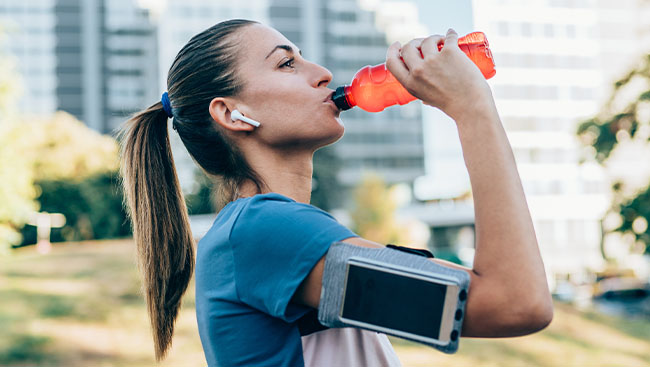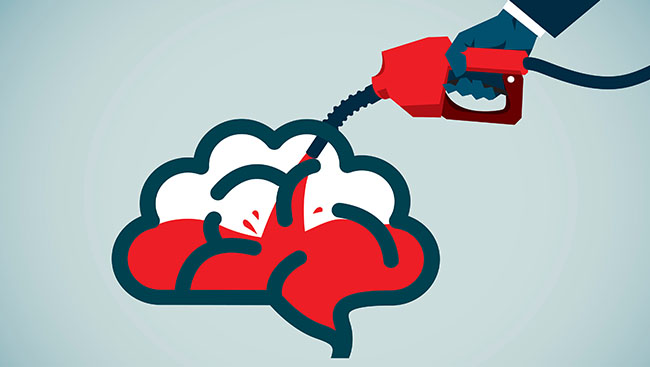Energy drinks are promoted as a means to stimulate the consumer both physically and mentally, promising to enhance alertness. Let’s start off with the basics: Do energy drinks even give you energy?
As the hustle and bustle of everyday life gets louder and busier, people can often get caught between juggling multiple commitments. Sometimes, the to-do-list seems to be an impossible task to get through within the constraint of 24 hours. Due to the exertion caused by errands and work, lack of sleep, or a draining combination of both, the body simply feels as if it is losing battery. For times like these exists a seemingly magic potion packaged in the form of a bottle: energy drinks.

Energy drinks are promoted as a means to stimulate the consumer both physically and mentally, promising to enhance alertness. Typically, an energy drink contains carbonated water, sugar, caffeine, and other herbs and stimulating substances that are potentially associated to mental alertness. The reasonings behind why the general population consumes energy drinks vary; it may be a regular habit for some and an occasional indulgence for others if the need arises.
Aside from tiredness during the day and lack of sleep, many consumers – especially younger ones – mix energy drinks with alcohol. People may be further inclined to consume energy drinks due to claims made surrounding increased concentration and weight loss.
For these reasons and beyond, from a global standpoint, the consumption of energy drinks has doubled over the past couple of decades, with the industry expected to grow approximately 7% by 2025. In light of this growth, considering that North Americans are the world’s heaviest energy drinkers, the question prevails of just how effective energy drinks are and what effects their consumption brings. Let’s start off with the basics: Do energy drinks even give you energy?
Studies addressing this question showcase that energy drinks impact the body similarly to the way that a cup of coffee or a can of cola works. Energy drinks may spike up energy momentarily, but there is often a crash that either leads to a slowdown or the desire to consume another drink.
After the first 10 minutes of consuming an energy drink, heart rate and blood pressure begin to rise with the peak of the stimulant staying at high levels for up to 45 minutes. However, just an hour into it, the body will start experiencing a sugar crash although it takes about 12 hours for the caffeine to be fully removed from the blood stream. That said, some regular caffeine consumers may feel withdrawal symptoms, such as headaches, for up to 24 hours.

Note that caffeine is a drug, which is why it is of no surprise that Health Canada has capped the caffeine limit at 180 milligram per single serving; this is comparable to a single cup of medium coffee. Dependency on caffeine can lead to restlessness, high blood pressure, insomnia, and other complications. In fact, irregular heartbeat is a common side effect experienced by those who consume energy drinks regularly. As with any sugary beverage, a higher risk of obesity and cavities is also present.
A more surprising fact is that Vitamin B, contained in most energy drinks and important for maintaining good health, can cause skin problems and liver toxicity when excessively consumed. In addition, those with anxiety may experience heightened nervousness, while increased blood sugars is more likely for those with diabetes. Therefore, considering pre-existing conditions is a must.
Given all these potential problems, why are energy drinks available in the local supermarket? The key lies in moderation. For a healthy adult, the recommended caffeine intake is 400 milligrams of caffeine per day. The number goes down for children, teenagers, pregnant or breastfeeding women, and women trying to conceive. As such, it can be said that energy drinks should only be consumed in the amount of 1-2 cans per day. Of course, depending on each individual, personal preference, and the many side effects that come with prolonged use, it may be advisable to consume less.
Aside from monitoring usage and keeping intake to a minimum, there are various alternatives to incorporate into your lifestyle to get that energy boost, rather than relying on energy drinks. The word, then, is that energy drinks are not the worst, but they are also not the best. Resort to healthier alternatives when you can, but life happens. Depending on the circumstances and the need of the hour, grabbing a can or two may be okay. The important watchout is to be aware of what you are putting into your body and monitoring yourself for the effects. Read the labels, stay within a reasonable limit, and proactively prevent an unhealthy dependency. Even if it is just an energy drink, drink responsibly!

Methods to boost your energy level naturally:
1 Rest Up:
Aim to get 7-8 hours of sleep per night and you’ll feel much more prepared to take on the day with your full potential.
2 Get Moving:
Any physical activity – even a short walk – can do wonders in providing you with the kickstart you need to get things done.
3 Hydrate Yourself:
You’re constantly losing water throughout the day when you sweat and urinate. Replenish your internal reserve to avoid getting dehydrated, which leads to lost energy.
4 Eat Well:
You are what you eat. Eating junk food and overeating can cause one to feel lethargic. Eating a well-balanced diet keeps you energized.
5 Socialize:
Talk to others and keep your brain valves flowing. We are social animals, after all. Chatting and sharing a laugh with a friend can rejuvenate you.
6 Stress Less:
Easier said than done, look for ways to keep checking in with your mental health and make an effort to worry less as it may be the cause behind your energy drainage.
7 Buy Alternatives:
Just don’t stock up on your energy drink section of the fridge to avoid easy access. Replace with herbal options, fruit teas, decaf coffee, or other pick-me-ups instead.




